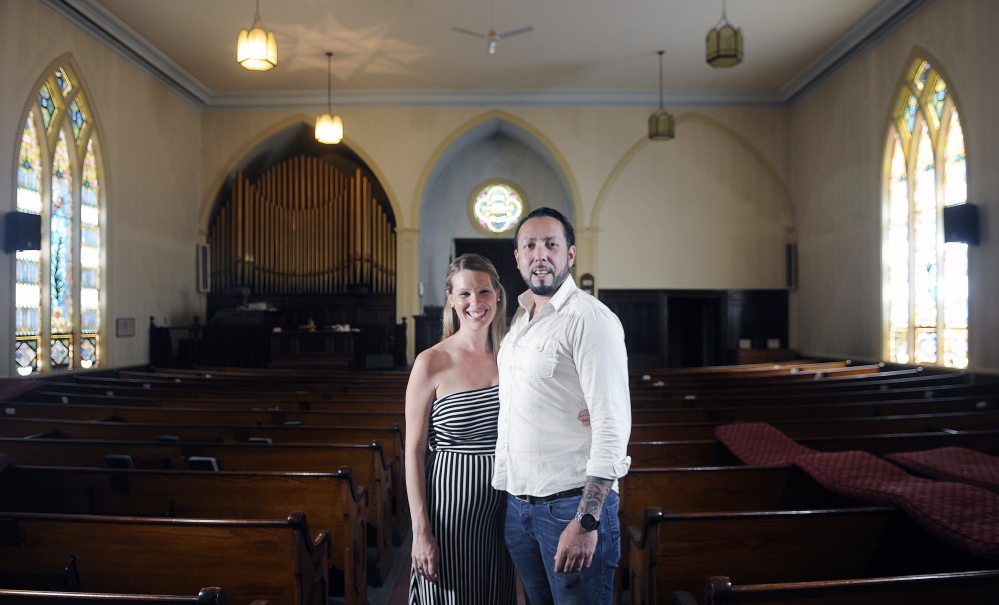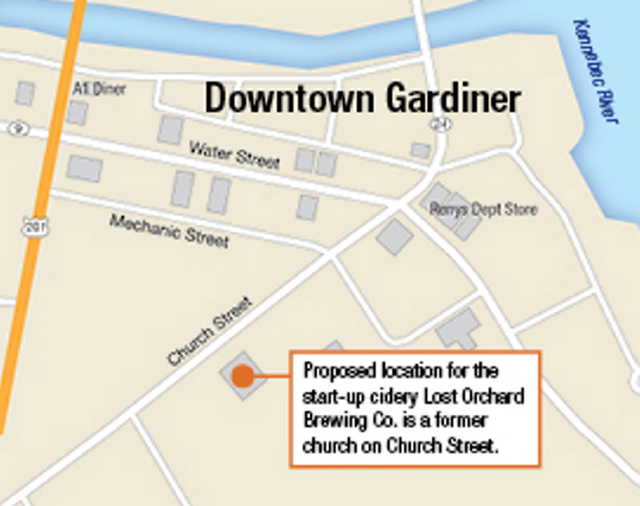A proposal to open a hard cider brewery in a former church in Gardiner is still up in the air after the Planning Board requested more details about the plan at its meeting Tuesday night.
The hard cider proposal is unique because it’s the first to use a new zoning ordinance that allows for a handful of commercial uses in some older buildings in residential neighborhoods. Councilors passed the change in June to help encourage development in older, nonresidential buildings stuck in the high-density residential zone.
The start-up cidery, Lost Orchard Brewing Co., wants to use the former congregational church on Church Street to make the cider and eventually offer tastings to the public in the former sanctuary hall. The building, which was built in 1843, is bordered by houses on its two sides and back. Another church, First Baptist Church of Gardiner, is on the other side of the street a little up the hill.
The Planning Board is scheduled to meet again at 5 p.m., Monday, July 28. It’s expected to offer its recommendation to City Council on whether the proposal fits the qualifications of the adaptive reuse overlay district and what changes to the zoning rules are needed.
Councilors, who will ultimately decide whether to approve the plan, will likely discuss it at their Aug. 6 meeting.
A few nearby residents have said they are concerned about a brewery opening in the church, but part of the additional information requested by the board will include details of the potential impact on the neighborhood and what can be done to reduce the effects of the new business.
Nate Mitchell, 84, who lives on the other side of Church Street from the proposed site, said he doesn’t understand why a hard cider brewery would be allowed in a residential area, and he thinks it would be a travesty to put it there.
“I’m very concerned about the tranquility of the neighborhood,” Mitchell told the board.
In a phone interview Wednesday, Mitchell said he’s concerned the business would disrupt the peace and quiet of the neighborhood. There are other buildings in the city that would make more sense, he said.
“It would no longer be a residential neighborhood with a brewery right in the middle of it. It doesn’t fit. Period,” Mitchell said.
But David Boucher, who founded the company with Kristina Nugent, said the business wouldn’t disrupt the neighborhood. He plans to operate Monday through Friday during normal business hours. The increased traffic to the business would be less than what the building attracted as an active church, Boucher said.
“There’s nothing in the nature of what we’re doing that should have any bit of negative impact on the neighborhood,” he said. “We’re coming to this community to become part of it. Granted, we’re doing business in the community, but it’s going to help everything.”
Another nearby resident, Hannah Gregory, submitted a letter to the Planning Board with concerns about the proposal. Gregory, of School Street, wrote she wasn’t sure she and her husband would have bought their house if a brewery had been directly behind it, but at the meeting she said their concerns were settled after speaking with Boucher about his plan.
Boucher said he and Nugent, both of New Harbor, signed a purchase-and-sale agreement to buy the property from the church for $100,000 if the city approves their plan. Part of the reason for choosing the church is because Boucher wants to restore it as a historical rehabilitation project, he said.
If all goes as planned, Boucher said he hopes to have the first batch of cider ready in time for apple season this fall. Maine Apple Company in Monmouth will provide the cider, he said.
The company will distribute to stores once it begins producing cider, Boucher said. They plan to locate the three 1,000-gallon tanks in a room in the back of the church and reinforce the floor to hold the weight.
While the Planning Board will review the more technical aspects of the plan, the City Council will consider whether reuse of the church will benefit the public and the city and if that wouldn’t happen if the property is developed under the current residential district restrictions.
The new zoning process can be used only for buildings that are no longer economically viable or physically suitable for uses allowed in the districts in which they’re located. Finding a way to allow the repurposing of these types of buildings in residential districts is included as an action item in the city’s proposed comprehensive plan, which councilors were scheduled to review for the first time at their meeting Wednesday.
Nate Rudy, director of economic and community development for the city, said councilors need to decide whether a new use outweighs any impact or perceived impact on the surrounding neighborhood.
“It stands to reason that in some cases there may be some minor impact in the (neighborhoods), but the real question is, is the impact worth making the accommodation to attract the business,” Rudy said, “and that’s going to be made on a case-by-case basis.”
Paul Koenig — 621-5663
Twitter: @paul_koenig
Send questions/comments to the editors.




Success. Please wait for the page to reload. If the page does not reload within 5 seconds, please refresh the page.
Enter your email and password to access comments.
Hi, to comment on stories you must . This profile is in addition to your subscription and website login.
Already have a commenting profile? .
Invalid username/password.
Please check your email to confirm and complete your registration.
Only subscribers are eligible to post comments. Please subscribe or login first for digital access. Here’s why.
Use the form below to reset your password. When you've submitted your account email, we will send an email with a reset code.